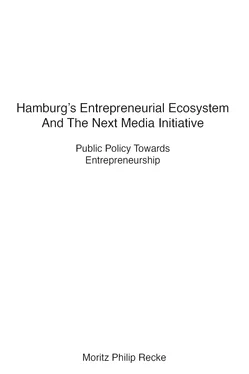Moritz Philip Recke
Hamburg’s Entrepreneurial Ecosystem And The Next Media Initiative
Public Policy Towards Entrepreneurship
Hamburg’s Entrepreneurial Ecosystem And The Next Media Initiative
Public Policy Towards Entrepreneurship
Moritz Philip Recke
This manuscript was submitted as a master thesis on December 5, 2016 to obtain the degree of Master of Arts in Next Media (M.A.) at the Faculty of Engineering and Computer Science at Hamburg University of Applied Sciences in Hamburg, Germany.

Imprint
Texts: © Copyright by Moritz Philip Recke
Cover: © Copyright by Moritz Philip Recke
Publisher:
Moritz Philip Recke
Max-Brauer-Allee 243
22769 Hamburg
Germany
mail@moritzrecke.com
www.moritzrecke.com
Preface
The thesis was created in late 2016 and builds on research done at the Business School of University of New South Wales (UNSW) in Sydney, Australia, in early 2016 during an academic research exchange program. Over a period of several months the regional entrepreneurial ecosystem and the public policy agenda towards entrepreneurship in Sydney were analyzed. This case study led to a subsequent publication as a peer-reviewed article at the ACERE conference in Melbourne in February 2017 {1}
and was later issued as an updated version in 2018 as part of the SEAANZ Research Book Series{2}. The thesis manuscript takes the research to Hamburg, Germany, to evaluate regional entrepreneurship policy in greater detail.
I want to thank both Dr. Susanne Draheim and Prof. Dr. Kai von Luck who supervised the thesis and field research.
Autor: Moritz Philip Recke
Topic: Hamburg’s Entrepreneurial Ecosystem And The Next Media Initiative - Public Policy Towards Entrepreneurship
Keywords: accelerator, angel, angel investor, business angel, company builder, economic policy, economy, ecosystem, entrepreneur, entrepreneurship, entrepreneurial ecosystem, employment, entrepreneurship, financing, founder, Germany, growth, high-growth, high-growth venture, Hamburg, incubator, innovation, innovation policy, investment, investor, job creation, location development, media, metrics, next media, policy, public policy, regional development, startup, startup economy, startup ecosystem, venture capital, vc
Abstract:
Entrepreneurship, more specifically the formation of tech startups, is often attributed with economic growth and job creation due to their high-growth potential by many policy makers around the world. This link is widely debated in scientific literature, which does not necessarily seem to inform public policy. The City of Hamburg established a Next Media Initiative, focusing on media and IT industry related innovation to nurture the future development of this industry cluster with the help of high-growth ventures. This master thesis explores the composition of Hamburg's entrepreneurial ecosystem, local government efforts to facilitate its development and the (dis)connect between municipal innovation policy and academic literature.
Autor: Moritz Philip Recke
Thema: Hamburg’s Startup-Ökosystem und die Next Media Initiative - Politik für Unternehmertum
Stichworte: Accelerator, Angel, Angel Investor, Arbeitsplätze, Beschäftigung, Business Angel, Deutschland, Entrepreneure, Entrepreneurship, Finanzierung, Gründer, Hamburg, Inkubator, Innovation, Innovationspolitik, Investition, Investor, Kapital, Medien, Metrik, Next Media, Ökosystem, Politik, Regionale Entwicklung, Risiko, Risikokapital, Skalierung, Standortpolitik, Startup, Startup-Ökosysteme, Unternehmer, Unternehmertum, Wachstum, Wirtschaft, Wirtschaftspolitik
Kurzzusammenfassung:
Unternehmertum (Entrepreneurship), insbesondere die Gründung von Tech Startups, wird aufgrund des enormen Wachstumspotentials solcher Unternehmen von vielen Politikern weltweit oft mit Wirtschaftswachstum und der Schaffung von Arbeitsplätzen verbunden. Diese Verknüpfung wird in der wissenschaftlichen Literatur umfassend diskutiert, wissenschaftliche Erkenntnisse fließen aber nicht zwingend in die Entwicklung politischer Strategien zur Wirtschaftsförderung ein. Die Freie und Hansestadt Hamburg hat eine Next Media Initiative gegründet, welche mit einem starken Fokus auf die Medien- und IT-Branche die Entwicklung dieses Wirtschafts-Clusters fördert, insbesondere mit Hilfe von Startups mit hohem Wachstumspotential (high-growth ventures). Diese Masterarbeit untersucht die Zusammensetzung des Startup-Ökosystems (entrepreneurial ecosystem) in Hamburg, die Bemühungen der lokalen Verwaltung dessen Entwicklung zu fördern und Deckung der regionalen Innovationspolitik mit wissenschaftlicher Literatur.
Introduction:
Entrepreneurship, more specifically the formation of tech startups, is often attributed with economic growth and job creation due to their high-growth potential by many policy makers in the world. This link is widely debated in scientific literature, which does not necessarily seem to inform public policy.
The City of Hamburg established a Next Media Initiative - nextMedia.Hamburg - in 2014, focusing on media/IT industry related innovation to nurture the future development of this industry cluster with the help of high growth ventures.
This master thesis explores the composition of Hamburg's entrepreneurial ecosystem, local government efforts to facilitate its development and the (dis)connect between municipal innovation policy and academic literature.
Method:
With its nextMedia.Hamburg initiative within the media/IT industry cluster, the City of Hamburg aims to support the entrepreneurial ecosystem as well as the media and creative industry in general. In various official documents and on a dedicated nextMedia.Hamburg website the efforts to nurture innovation, to create more ventures and maintain Hamburg as a media industry capital are published.
This thesis will introduce the local entrepreneurial ecosystem along with its most relevant stakeholders and review the regional innovation strategy and nextMedia.Hamburg initiative in 3 parts.
Taking into consideration the current setup of Hamburg’s entrepreneurial ecosystem and its various entities, the first part will summarise salient points of the innovation strategy outlined by the City of Hamburg as well as key elements of the nextMedia.Hamburg initiative’s activities by which the regional government aims to attain its goals.
The second part takes relevant aspects of the outlined strategy and activities and reviews them from an academic perspective, considering arguments presented by Shane (2009), Audio et al. (2007), Morris et al. (2015), and Brown & Mawson (2015).
The third part draws on research findings to classify the outlined policy agenda and its measures to support the entrepreneurial ecosystem in Hamburg and discusses them in regards to Regional Innovation Systems (RIS) analysed by Moutinho et al. (2015) and the Triple Helix Approach (Ranga and Etzkowitz 2016) to asses their possible impact on the entrepreneurial ecosystem in Hamburg.
Results:
This thesis makes 4 contributions. Foremost, several disconnects between local entrepreneurship policy in Hamburg and academic literature on entrepreneurship policy are explored by analysing both the regional innovation strategy and nextMedia.Hamburg initiative's documents and activities. Additionally it is shown how relevant scientific findings have not been taken into consideration despite collaboration with research facilities at local universities. Third, it is illustrated how the activities to nurture entrepreneurial activity by the nextMedia.Hamburg initiative lack a connection to actionable metrics to successfully measure results and adapt for change. As a fourth contribution, this thesis draws on common challenges in developing regional entrepreneurship policy and proposes closer collaboration between the research community, industry and policy makers.
Читать дальше













